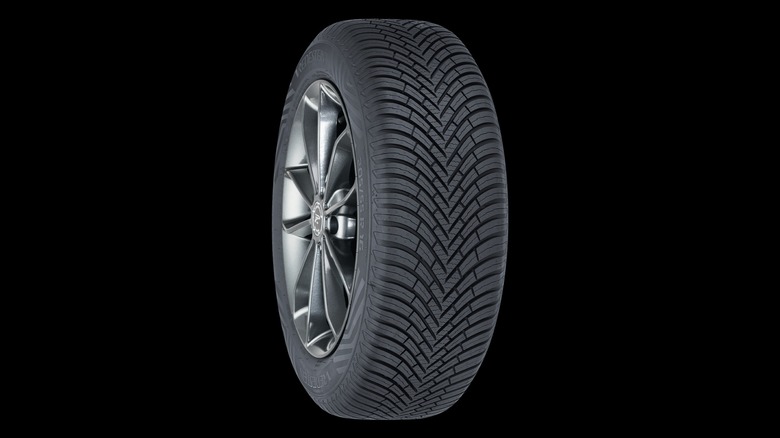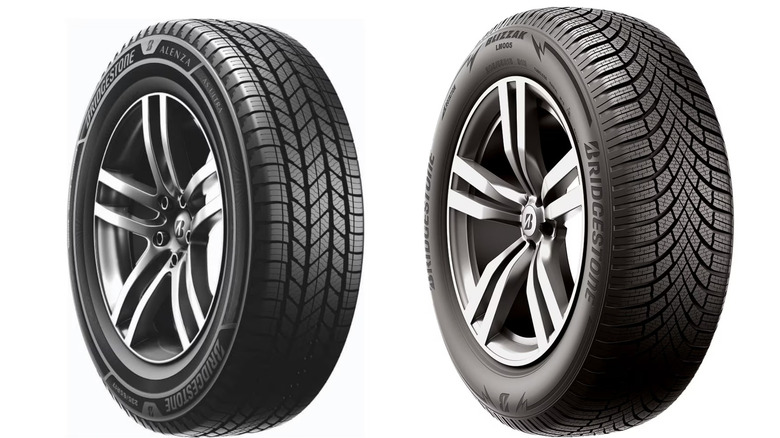Winter Vs. All-Season Tires: What's The Difference And Which Are Right For You?
If you're in the market for a new set of tires, you may feel overwhelmed by all the different options. From off-road and all-terrain tires to those designed for drag racing, all-season driving, winter weather, and more, there's a vast amount of different types of automotive tires from which to choose. To make matters worse, car tires can be extremely expensive, meaning that buying the incorrect set can come with steep consequences for your wallet.
Fortunately, we here at SlashGear can help. As a former professional auto repair technician and a lifelong car enthusiast, I'll break it down for you. The primary difference between winter or snow tires and all-season tires is the tread composition. While all-season tires are built to provide a smooth, comfortable, and quiet driving experience in most types of weather, winter tires are engineered specifically for the colder and harsher conditions associated with heavy winter climates.
Winter tires typically have softer tread, capable of flexing to greater degrees in frigid weather below 45 degrees Fahrenheit, as well as deeper, more aggressive tread lines to bite into ice and snow — some winter tires may even have metal studs or cleats installed for extra grip. All-season tires, on the other hand, are designed to handle most types of weather when temperatures are greater than 45 degrees Fahrenheit. They typically have less aggressive and more rigid tread patterns, and they're the go-to choice for people who live in areas with moderate climates year-round.
Those are the key differences between winter and all-season tires. However, if you're curious about some of the other options available, like all-weather tires, or you're interested in learning how to determine which style is right for you, stick around. We'll cover it all in simple terms. Let's dive in.
What about all-weather tires?
Before we dive into how to choose between winter tires and all-season tires, it may be helpful to touch briefly on another type of tire that you'll probably hear about while shopping. All-weather tires may sound similar to all-season tires, but they actually have a couple of key differences.
While all-season tires are ideal for most weather types and areas with moderate weather all year, all-weather tires are designed for cooler and wetter climates. They're solid choices for those living in regions that have longer, cooler, and wetter winter months. However, they're not ideal for extremely warm regions. All-weather tires also aren't the same thing as winter or snow tires. They're not designed for use in severe snow or ice, and if you live somewhere that experiences harsh winters with heavy snowfall, you may need a set of each tire type.
Other than those differences, all-weather and all-season tires provide similar benefits. Both offer a comfortable, quiet ride, as well as solid performance in most normal weather conditions. And if you live somewhere that doesn't experience harsh winters, you'll most likely want one or the other for your car.
Should you buy all-season or winter tires?
Choosing between all-season tires (above left) and winter tires (above right) can be tricky. That's especially true thanks to the high prices attached to car tires and the fact that you'll probably want to spend your money in the wisest and most efficient way possible. Fortunately, the decision doesn't have to be that hard. Considering a couple of key factors can help you make your choice quickly and correctly.
One of the most important things to consider is the weather where you live. Do you live somewhere that experiences extremely long and harsh winters, like northern Utah or the mountains of Colorado? If so, snow tires might be a solid investment. On the other hand, if you live somewhere with relatively mild weather year-round, like California, or somewhere with extremely warm weather, like southern Florida, all-season tires are probably your best move.
Next, the type of car you drive will also play a role in whether winter tires are necessary. If you own a four-wheel-drive or all-wheel-drive vehicle that already has a solid set of tires with aggressive off-road or all-season tread, you may not need snow tires, even if you live in a relatively cold area.
All of that said, for people living in regions that face extreme winters, buying two sets of tires is often the reality. Many people living in places like Utah, Colorado, or North Dakota buy a set of all-season tires to use most of the year and then switch to a dedicated set of snow tires once the cold weather sets in. Doing so may be a bit expensive up front, but using two sets of tires throughout the year will extend the life of each over time.


